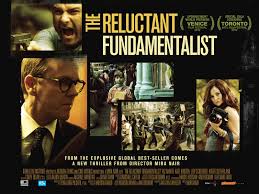The Reluctant Fundamentalist
By Hope Madden
“Have you ever been brought a split second of pleasure at arrogance brought low?”
This line and the moments in The Reluctant Fundamentalist preceding it require the skill of a nimble actor; one who has not yet betrayed his character’s allegiances or true nature and who can balance what’s been revealed with what has yet to be unearthed.
Riz Ahmed is not that actor.
He’s proven his mettle in previous efforts – most ably in the dark comedy Four Lions – but he can’t rise above the condescending tone director Mira Nair creates as his character – Pakistani born, Princeton educated Changez – spins an enlightening tale to an American journalist (Liev Schreiber).
The son of a poet, Changez grew up hungry for the financial opportunities offered by the American dream, but chasing that dream during the upheaval of 9/11 caused him to rethink his priorities, his heritage, and his relationship with the US. Back in Pakistan, he finds himself a person of CIA interest when his white colleague at the university is abducted.
An international thriller seems an odd choice for Nair (Monsoon Wedding, The Namesake), but the tender, internal complications of a culture clash are certainly in her wheelhouse. Unfortunately, she does not deliver the tempo of a thriller, and her cast underwhelms with the emotional turmoil.
Nair’s team of screenwriters reworked Mohsin Hamid’s novel, clarifying ambiguities, patronizing characters and audience alike, and generally strangling the prose into submission. The film is after the element of audacity in the author’s work, but neglects the underlying earnestness that earns it.
The cast doesn’t help much. Ahmed may be in over his head, but Kate Hudson fails entirely. Her grieving lover unready for a relationship feels more like an intellectually stunted, artistically talentless flirt who’s only just awakened from a nap.
The usually reliable Schreiber has little opportunity, but his final image dooms his performance as well. Meanwhile, Keifer Sutherland is miscast and Nelsan Ellis once again settles for stereotype rather than character.
Characteristically, Nair mines the work for unexpected humor, which helps the film keep an unsure footing. Given the story being told and lessons being learned, this is an important victory. Her visual flair adds vibrancy to the sometimes dry story as well, and there are elements of Hamid’s work that still shine brightly enough to command your attention throughout the film’s running time.
Plus, let’s be honest, as culture clash and terrorism on film go, at least it’s not Java Heat.
http://www.youtube.com/watch?v=xfC45oq_drU
